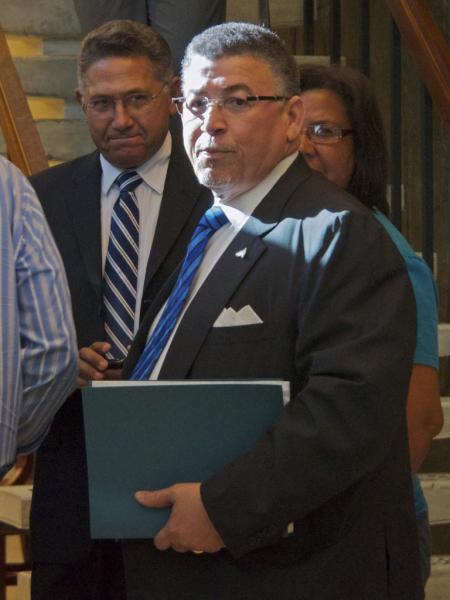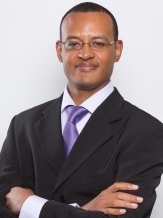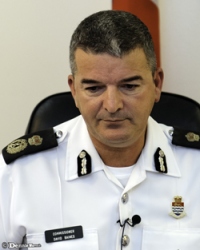Archive for June 28th, 2013

Mac trial set for March 2014
 (CNS): Former premier McKeeva Bush sat attentively in Grand Court Friday morning, where he was summoned for a mention hearing on the eleven criminal charges against him, including allegations that he used a government credit card to unlawfully withdraw thousands of dollars in cash from ATMs in US casinos while travelling for business and pleasure. The charges are for misconduct while in public office by dishonestly using government credit cards. The case is set for mention on 13 September and the courts have a trial date penciled in for March next year, while they wait to confirm the date with his full defence team. No further charges were laid against him.
(CNS): Former premier McKeeva Bush sat attentively in Grand Court Friday morning, where he was summoned for a mention hearing on the eleven criminal charges against him, including allegations that he used a government credit card to unlawfully withdraw thousands of dollars in cash from ATMs in US casinos while travelling for business and pleasure. The charges are for misconduct while in public office by dishonestly using government credit cards. The case is set for mention on 13 September and the courts have a trial date penciled in for March next year, while they wait to confirm the date with his full defence team. No further charges were laid against him.
Bush, who is the UDP leader and leader of the opposition in the Legislative Assembly, was represented by his defence lawyer, Michael Alberga.
The legal team were asked to inform the court at the earliest opportunity if they had concerns regarding the possible conflict for members of the local bench and to submit requests if necessary for an outside judge to preside at trial.
Related articles:
Mac’s charges consolidated (CNS, 11 June 2013)

Christian says process unfair
 (CNS): Richard Christian, who was bumped off the ballot sheet in Bodden Town before the general elections because he has a US passport, says that if Tara Rivers, a successful candidate for West Bay, loses her seat over a challenge on the same issue, she could then renounce her US citizenship and run in any subsequent by-election, an opportunity that he was not given. Rivers, who is now a Cabinet member, must defend her right to run in the May election on 17 July, when the court will hear both side of the petition challenging her qualifications on two counts, one of which is that she may still hold US passport. Christian said he was “closely watching Tara's case” and was currently looking at his options regarding further action.
(CNS): Richard Christian, who was bumped off the ballot sheet in Bodden Town before the general elections because he has a US passport, says that if Tara Rivers, a successful candidate for West Bay, loses her seat over a challenge on the same issue, she could then renounce her US citizenship and run in any subsequent by-election, an opportunity that he was not given. Rivers, who is now a Cabinet member, must defend her right to run in the May election on 17 July, when the court will hear both side of the petition challenging her qualifications on two counts, one of which is that she may still hold US passport. Christian said he was “closely watching Tara's case” and was currently looking at his options regarding further action.
Christian was nominated as a People’s National Alliance candidate in Bodden Town but later advised by the district’s returning officer, Ned Solomon, that he was not qualified to be a member of the Legislative Assembly, pursuant to section 62 (1) of the Constitution. This is the section that deals with nationality as Christian owns a valid American passport. As this is considered an allegiance to another country, the official concluded that Christian could not run and the Elections Office said his name was removed from the ballot.
“On Nomination Day when the returning officer for BT asked me whether I would give up my US citizenship, I advised him yes. When I was called later that evening by the BT returning officer, one of the supervisors from the Elections Office and someone from the Attorney Generals Chambers, I asked whether I could give up my US citizenship before election day and I was told no it was too late," Christian told CNS. “My concern now is if a by-election is called in WB, it could give Tara the opportunity to renounce her US citizenship and run again, whereas I was not giving that opportunity.”
The petition challenging Rivers’ election as a member of the Legislative Assembly for West Bay was filed on behalf of John Gordon Hewitt, the husband of Velma Powery-Hewitt, the UDP candidate who came in fifth in the district poll. The petition claims she did not fulfill the residency requirement to qualify as a candidate. Hewitt also states in the petition that Rivers was born in the US and continues to hold a passport through her own act, which also disqualifies her from office.
“Tara, Cline [Glidden] and myself all appear to be in the same boat, but why was it that the returning officer for WB was allowed to nominate them, whereas the BT returning officer disqualified me?” Christain asked. “To my understanding, all three of us got that late call and/or in some cases was called to a meeting the day after nomination day at the elections office and the supervisor for the Elections Office knew the circumstances of each of our cases and therefore should have ruled that all 3 cases be treated the same.”
The would-be politician said he was not aware that holding a valid US passport was a ground of disqualification. “My interpretation (as well as a few lawyers I spoke with) of 62 (1) (a) was if you obtained a second citizenship by your own act. I felt that I was qualified as 61 (2) (b) states I can have another ‘citizenship’ by birth,” he said.
“To me the passport is just a travel document and prior to 9/11 US citizens could travel to Cayman with a drivers license and birth certificate which I use to do. When it became mandatory for all US citizens to have a valid passport, I had no other choice but to renew,” Christian explained. He said that section, which reads: "by virtue of his or her own act, under any acknowledgement of allegiance, obedience or adherence to a foreign power or state", is very broad.
“Being born in the US, I have a US birth certificate. Is applying for a copy of your birth certificate considered acknowledgement of allegiance, obedience or adherence to a foreign power or state?” he asked. “One of the questions that the BT returning officer asked me was which immigration line do I go in when I arrive in the US. To me that question serves no purpose, what do foreign nationals do when they go in the visitors line only to be told by the immigration officers to go in the US residents line because it's shorter (it has happen many times). Does that mean you’re a US resident?”
US law states that people who relinquished their US citizenship are subject to an exit tax on everything they own as if they had sold it all. If an individual has filed tax returns for seven years they can proceed with relinquishing their US citizenship, but the process involves lengthy form filling, an interview at the US embassy, reflection time for the individual to seriously consider the implications of their actions and then a decision process by the US authorities.
People who live in the Cayman Islands who are US citizens, green card holders or even just have spent more than 183 days in any calendar year in the United States, are all required to file tax returns in the US, as they may be liable to pay tax there.
Those living and working outside the US are permitted to earn US$95,100 per year before becoming liable to pay tax, but tax returns must be filed to enjoy this benefit.
“If the IRS gets to you first they have the ability to deny you the exclusion,” according to US tax expert Shawn P Wolf.
Related articles:
Owe US tax? Get a tax lawyer (CNS Business, 1 February 2012)
Dump Uncle Sam, pay exit tax (CNS Business, 2 February 2012)
PNA hopeful off the ballot (CNS, 2 April 2013)
Christian denied appeal (CNS, 3 April 2013)
Rivers' election challenged (CNS, 13 June 2013)
Election challenge hearing set (18 June 2013)

Fire burns cars at Car City
(CNS): The Royal Cayman Islands Police Service is reporting that eight to ten vehicles have been burned at the Car City compound on Dorcy Drive. Police and the Fire Service are currently at the scene. No injuries have been reported. Check back to CNS later for more details.

2013 Constitution Day Message
On 4 July, 1959 the concept of constitutional development began in the Cayman Islands after Caymanian Assemblymen petitioned the United Kingdom resulting in the issuance of a Royal Order-in-Council. After several revisions, the major one in 1972, the Cayman Islands Constitution Order 2009 came into force on 6 November, 2009 following Cayman’s first national referendum.
Often referred to as the highest law in the land, the impact of the Constitution on our daily lives cannot be overstated. The concept of the document is that democracy is the cornerstone of our country. As a country which has a rich heritage of friendliness, generosity and resilience the Constitution only reaffirms our desire as a nation to live and work in an environment which respects each other’s values and rights.
Providing a foundation for our people and a framework for our government, the 2009 Constitution has brought positive changes to how the country is run by creating a more balanced style of governance through increased consultation and accountability at a local level. It provides the people with greater protection for our rights and freedoms and greater authority to defend those rights and freedoms. It envisages that all of us have a responsibility to embrace and defend our differences.
The Constitutional Commission is a three-person body which seeks to advise the Government on questions concerning constitutional status and development in the Cayman Islands; to publish reports, discussion papers, information papers and other documents on constitutional matters affecting the Cayman Islands; and to promote understanding and awareness of the Constitution and its values.
As we continue to work towards fulfilling our constitutional mandate the Commission will, in the near future, be commencing a round of public consultation to solicit input and comment from the people on areas of the Constitution in respect of which persons have questions, thoughts, concerns or require clarification. While a wholesale constitutional review is unwarranted and undesirable so soon after its coming into force, there can be little doubt that there are several sections of the Constitution that do need review and amendment particularly in the context of issues surrounding our recent general elections, many of which have been the subject matter of spirited public debate. Our Constitution can only serve us well if it is clear and concise and as free of ambiguity and uncertainty as one can reasonably make it to be.
On 1 July, 2013 let us not only celebrate the day as a public holiday, but let us instead each take this opportunity to tell another what this day really means for the Cayman Islands. Let us all take a moment to remind ourselves that today is the day in which we celebrate our heritage and the freedoms we have been blessed with because of the work of our forefathers to create this democratic nation underpinned by a Constitution that truly reflects the needs, aspirations and desires of our people..
You may contact the Constitutional Commission by e-mailing info@knowyourconstitution.ky or calling 244-3685.
Remember it’s YOUR Constitution! Embrace it!

Top cop changes JP policy
 (CNS) Updated: The police commissioner admitted this week that the situation regarding the justice of the peace who had signed a police warrant without having a clue about what he was being asked to sign or the crime that the warrant related to was both “slack procedure and slack practice”. David Baines said that the policies regarding JPs has now been changed and police will from now on use officers of the courts during daytime hours. For out of hours warrants, only JPs who have been trained or who have legal knowledge will be asked to sign. He said the list of justices of the peace that they would use had been revised and the JP in question had been removed. (Photo by Dennie warren Jr)
(CNS) Updated: The police commissioner admitted this week that the situation regarding the justice of the peace who had signed a police warrant without having a clue about what he was being asked to sign or the crime that the warrant related to was both “slack procedure and slack practice”. David Baines said that the policies regarding JPs has now been changed and police will from now on use officers of the courts during daytime hours. For out of hours warrants, only JPs who have been trained or who have legal knowledge will be asked to sign. He said the list of justices of the peace that they would use had been revised and the JP in question had been removed. (Photo by Dennie warren Jr)
Baines told CNS that the JPs will now also be asked to sign a declaration that they had seen and understood the evidence and why they were signing and an inspector will be required to approve all warrants.
The commissioner acknowledged that his officers were at fault in the recent case relating to Sandra Catron, which caused a warrant to be thrown out in the case against her for allegedly misusing an ICT Network. He noted that the deputy governor had indicated the need for a review of the JP system.
However, the issue was that in the Catron case the police had clearly chosen the JP from a long list, many of whom are lawyers. The JP, who had clearly been used by RCIPS officers on many occasions, admitted in court that in more than two decades he had never refused to sign a warrant, and on this occasion had seen no evidence, had been given no information, had sworn no oath and had no clue about the crime.
The judge in question had been shocked at the revelations and hadthrown the warrant out in relation to the case which the crown appears to still be prosecuting.
Justices of the peace are appointed by the governor and do not go through the same selection process as would happen for a judge or magistrate, according to Court Administrator Kevin McCormac. The chief justice has no direct responsibility for regulating the JPs or any control over how a JP performs his or her duties other than those performed in court (typically sitting as a lay magistrate in child care cases).
"Following appointment, justices are sworn in and, in recent years, training has been offered by the judiciary at that stage, recognising the growing complexity of the exercise of the powers that a Justice of the Peace is given by law," McCormac said. "However, there is still considerable need for work to be done to ensure that the important quasi-judicial powers given to Justices of the Peace under the law are exercised in full knowledge and understanding of legal procedures and of the law."
The chief justice is pleased that the deputy governor is said to be reviewing the process and effect of appointment, McCormac said noting that he, himself, would ensure that every assistance was given to that review.
“I am absolutely elated that a policy change has come about as a direct result of my unlawful arrest and search," Catron told CNS. "The RCIPS are to be commended for taking this first step to correct the problem. However, I also think that the law must be amended to reflect that only magistrates/judiciary can sign search warrants. We have seen before that the RCIPS are not always the most efficient at following their own internal procedures and policies.
"The law must be changed and I will continue to lobby our legislators for this to occur. Only when that happens will a feel victorious!” she added.
Related article on CNS: